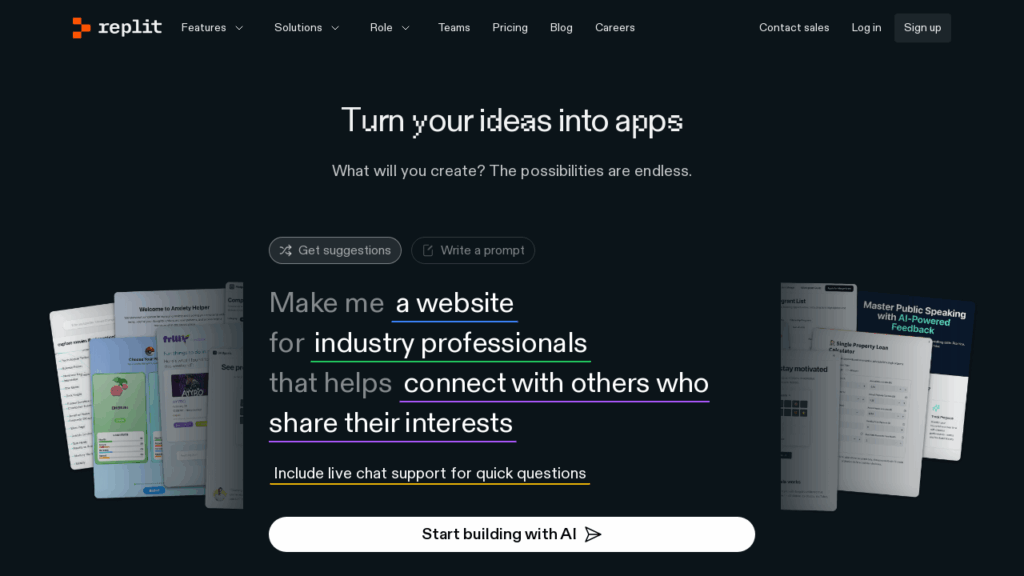In a world where coding skills have become increasingly valuable, Replit stands as a revolutionary platform that empowers users to transform ideas into fully functional applications without the traditional barriers to entry. According to a recent industry report, development teams using collaborative browser-based IDEs like Replit experience an 85% increase in productivity, with an average reduction in development costs of $140,000+ for small to medium-sized projects. This staggering transformation isn’t just about cost savings—it’s about democratizing software creation for everyone from complete beginners to seasoned developers.
What is Replit?
Replit (replit.com) is a browser-based integrated development environment (IDE) that allows users to write, run, and deploy code in over 50 programming languages without any local setup. It combines a code editor, terminal, file system, and deployment tools into a single, unified platform that works entirely in the cloud. This eliminates the traditional friction points of software development and creates a seamless experience for coding, collaborating, and shipping applications.
Core Features of Replit
-
Browser-Based IDE: Code from anywhere with a fully-featured development environment that requires no downloads or installations
-
Multi-Language Support: Write code in Python, JavaScript, TypeScript, Node.js, HTML/CSS, C++, Go, and dozens of other languages and frameworks
-
Replit Agent (AI Assistant): Leverage AI capabilities to write, debug, and understand code through natural language interactions
-
Built-in Database: Every project includes a pre-configured, production-grade database that’s already connected and ready to use
-
User Authentication: Add secure user sign-ups and logins to your application with built-in Replit Auth
-
Secure Integrations: Connect to third-party services like Stripe, OpenAI, and others while keeping your API keys secure
-
Deployment & Hosting: Deploy applications with a single click and share them publicly with custom domains
-
Real-Time Collaboration: Code alongside teammates or friends with Google Docs-like collaborative editing
-
Version Control: Track changes to your code with Git integration and connect to GitHub repositories
-
Enterprise Security Features: SSO access, SOC 2 compliance, private deployments, and role-based access control for team environments
Replit Pricing Plans
|
Plan |
Price |
Storage |
RAM |
vCPUs |
Key Features |
|---|---|---|---|---|---|
|
Free |
$0/month |
500MB |
0.5GB |
0.5 |
Basic IDE, public repls, community support |
|
Pro |
$10/month |
5GB |
2GB |
2 |
Always-on repls, private repls, multiplayer editing |
|
Teams |
$20/user/month |
10GB |
4GB |
4 |
Team management, private deployments, shared workspaces |
|
Enterprise |
Custom |
Custom |
Custom |
Custom |
SSO, SOC 2 compliance, dedicated support, RBAC |
Real-World Application: Zinus Success Story
Zinus, a global home furnishings company, faced challenges with a costly, time-consuming manual process for generating product documentation. By leveraging Replit’s collaborative environment and deployment capabilities, their team created an internal tool that automated this process entirely. The results were transformative:
-
Cost savings exceeding $140,000 annually
-
Reduction in documentation generation time from days to minutes
-
Elimination of human error in the documentation process
-
Improved cross-team collaboration through shared access to the tool
The Zinus team, without extensive development resources, was able to build, test, and deploy their solution entirely within Replit’s environment. The platform’s intuitive interface allowed team members with varying levels of technical expertise to contribute to the project, while its built-in deployment capabilities ensured that the tool was immediately accessible to everyone who needed it.
Replit vs. Competitors: How Does It Stack Up?
When evaluating Replit against other development platforms, several key differences emerge:
|
Platform |
Strengths |
Weaknesses |
|---|---|---|
|
Replit |
Browser-based, zero setup, collaborative features, one-click deployment, built-in database |
Resource limitations on free tier, occasional performance issues with complex projects |
|
GitHub Codespaces |
Deep GitHub integration, powerful customization, VS Code experience |
Higher cost, steeper learning curve, requires GitHub account |
|
CodeSandbox |
Frontend-focused, great for web development, template library |
Limited language support, less suited for backend development |
|
AWS Cloud9 |
Deep AWS integration, powerful terminal access, EC2 instances |
Complex setup, AWS knowledge required, higher cost |
|
Glitch |
Simple interface, community focus, good for beginners |
Performance limitations, primarily for web projects |
Pros and Cons of Replit
|
Pros |
Cons |
|---|---|
|
Zero setup required – start coding instantly |
Free tier has resource limitations |
|
Accessible from any device with a browser |
Internet connection required at all times |
|
Built-in deployment and hosting |
Limited advanced debugging capabilities |
|
Real-time collaboration features |
Some performance lag with very large projects |
|
Extensive language and framework support |
Not as customizable as local development setups |
|
AI-powered coding assistance |
Premium features require paid subscription |
|
Active community for support and learning |
May not be suitable for enterprise-level applications |
|
Integrated database solution |
Limited offline capabilities |
Who Should Use Replit?
Replit’s versatility makes it suitable for a wide range of users:
Beginners and Students: The zero-setup environment and intuitive interface make Replit perfect for those just starting their coding journey. Educational features and templates provide guided learning experiences.
Professional Developers: The ability to quickly prototype ideas, collaborate with teammates, and deploy projects makes Replit a valuable tool for rapid development cycles.
Educators and Schools: Classroom management features, assignment creation tools, and the ability to review student work in real-time make Replit an excellent platform for teaching coding.
Startups and Small Teams: With limited resources, startups benefit from Replit’s all-in-one solution that eliminates the need for complex DevOps setups.
Hackathon Participants: The speed of setup and collaboration features make Replit ideal for time-constrained coding competitions.
Frequently Asked Questions About Replit
Is Replit suitable for professional development work?
Yes, Replit offers professional-grade features including private repositories, always-on applications, custom domains, and team collaboration tools that make it suitable for professional development. Many startups and established companies use Replit for prototyping, internal tools, and even production applications.
What programming languages does Replit support?
Replit supports over 50 programming languages, including Python, JavaScript, TypeScript, HTML/CSS, Node.js, C++, Java, Ruby, Go, PHP, and many others. This broad language support makes it versatile for nearly any type of development project.
Can I deploy my Replit projects to production?
Absolutely. Replit includes built-in deployment capabilities that allow you to host your applications directly from the platform. You can connect custom domains, set up environment variables, and manage your deployments through an intuitive interface.
How does Replit’s collaborative coding work?
Replit offers real-time collaborative coding similar to Google Docs. Multiple users can work on the same project simultaneously, seeing each other’s changes in real-time. This feature includes cursor tracking, chat functionality, and the ability to see who’s currently viewing or editing the project.
Is Replit free to use?
Replit offers a free tier that includes basic features like public repositories, community support, and limited computing resources. Paid plans start at $10/month for individuals and offer additional features such as private repositories, increased resources, and always-on applications.
How secure is Replit for storing sensitive code?
Replit takes security seriously with features like secure secret storage for API keys, private repositories, and SOC 2 compliance for enterprise customers. The platform uses encryption for data in transit and at rest, and enterprise plans include additional security features like SSO integration and role-based access control.
Can Replit connect to external databases and services?
Yes, Replit can connect to external databases and third-party services. It includes built-in support for common integrations like MongoDB, PostgreSQL, and various APIs. The platform also provides secure secret storage for API keys and other sensitive credentials.

